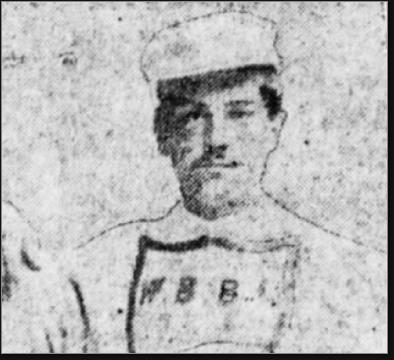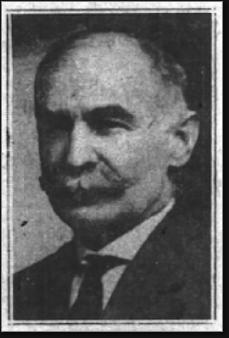|

Harry Deane
Sport: Baseball
Born: May 6, 1846
Died: May 31, 1925
Town: Trenton
John Henry Deane was born May 6, 1846 in Trenton. Harry, as he was known, came of age when baseball fever was sweeping through New Jersey at the end of the 1850s. He learned the game while attending the New Jersey Normal School. Like many baseballers of that era, Harry’s main sport was cricket. He was something of a prodigy, joining a junior club in Trenton at the age of 15 and showing enough talent as a bowler that he was plucked off the roster by the senior players—most of whom were English transplants—and took him on a playing tour of the Midwest that included a stop in Louisville, Kentucky.
The Deanes moved to Indianapolis toward the end of the Civil War and Harry and his brother Charles went with them. In 1866, Harry organized the Western Baseball Club, who went by the Westerns and Westerners. He was the WBBC’s captain and main pitcher. As baseballs became livelier toward the end of the decade, he distinguished himself as a swift and sure-handed outfielder. Harry’s catcher in 1867 was a teenager named Calvin McVey. That year the Westerners hosted the Olympic Club of Washington on their national tour. The pros from DC won easily, 106–21, but made note of McVey, who went on to have a long career in professional baseball.
Harry befriended the star of the Olympics, George Wright, whose brother, cricket pro Harry Wright, was putting together the Red Stockings baseball team in Cincinnati, which would embark on an undefeated national tour in 1869. Harry agreed to join the Wrights in 1870 as a kind of permanent substitute and went on tour with the Red Stockings. He played left field after shortstop George Wright injured his knee and fellow New Jerseyan Andy Leonard moved to the infield for several weeks.
 In 1871, the first professional baseball league was formed and Harry joined the Fort Wayne Kekiongas, who played the first official game in the new National Association. The Kekiongas were cobbled together from local stars like Harry, a handful of players who had been stranded in the Midwest during the 1870 season, and some men brought back from New York by their captain, George Mayer. Attendance was poor and soon the players went unpaid. Several quit and returned home and player-manager Billy Lennon left the club, too. Harry took over for five games before the team disbanded in August. In 1871, the first professional baseball league was formed and Harry joined the Fort Wayne Kekiongas, who played the first official game in the new National Association. The Kekiongas were cobbled together from local stars like Harry, a handful of players who had been stranded in the Midwest during the 1870 season, and some men brought back from New York by their captain, George Mayer. Attendance was poor and soon the players went unpaid. Several quit and returned home and player-manager Billy Lennon left the club, too. Harry took over for five games before the team disbanded in August.
During his time as a ballplayer, Harry was also an active cricket player. In one match he made 37 runs. He played both sports over the next two years before getting back into pro baseball. Several of Harry’s old Kekiongas called Baltimore home. In 1874, he was recruited to play the outfield for Baltimore’s NA team, known officially as the Lord Baltimores but commonly called the Canaries because of their bright yellow uniform accents. The Canaries went 9–38 but not for lack of talent. The roster featured several top players of the day, including Charlie Gould, Jack Manning, Charlie “Pop” Snyder and Charlie Sweasy. Sweasy, a hard-hitting infielder from Newark, had been a teammate in Cincinnati. Harry batted .246 and was second on the Canaries in at bats and runs, and third in hits.
Harry had continued to reside in Indianapolis during his ballplaying days and returned there permanently after baseball. He worked as a draftsman for the railroads and became the assistant city engineer in the 1890s. For much of his time in the public works department, he was in charge of improving and repairing the city’s streets. In 1897, Mayor Thomas Taggart arranged a charity benefit game featuring teams of local politicians. Harry played shortstop.
Harry retired at the age of 70 and moved in with his daughter and her husband after becoming an invalid. He passed away at the age of 79.
|
|
|